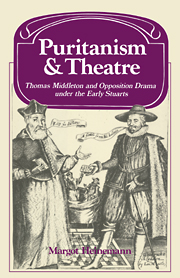Book contents
- Frontmatter
- Contents
- Introductory note
- 1 Time and Place
- 2 Puritanism, Censorship and Opposition to the Theatre
- 3 Middleton as Satirical Journalist
- 4 Early Satirical Comedies
- 5 How Anti-Puritan are Middleton's City Comedies?
- 6 Money and Morals in Middleton's City Comedies
- 7 Middle Years: Tragi-comedy and Moral Comedy
- 8 City Employments
- 9 Hard Times and Hengist, King of Kent
- 10 Political Satire: A Game at Chess
- 11 City Tragedy
- 12 Drama and Opposition, 1619–1640
- 13 From Popular Drama to Leveller Style: a Postscript
- Appendices
- Index
- Frontmatter
- Contents
- Introductory note
- 1 Time and Place
- 2 Puritanism, Censorship and Opposition to the Theatre
- 3 Middleton as Satirical Journalist
- 4 Early Satirical Comedies
- 5 How Anti-Puritan are Middleton's City Comedies?
- 6 Money and Morals in Middleton's City Comedies
- 7 Middle Years: Tragi-comedy and Moral Comedy
- 8 City Employments
- 9 Hard Times and Hengist, King of Kent
- 10 Political Satire: A Game at Chess
- 11 City Tragedy
- 12 Drama and Opposition, 1619–1640
- 13 From Popular Drama to Leveller Style: a Postscript
- Appendices
- Index
Summary
Middleton's two great tragedies, The Changeling (1621) and Women Beware Women, stand out sharply both from his earlier work and from other post-Shakespearean tragedy. What we have in these plays is not a complete turnabout, but rather a development of qualities and themes already traceable in Middleton's earlier comedies and tragi-comedies. All the same, there is a change, and a striking one, from the earlier work to The Changeling, which T. S. Eliot thought ‘more than any other play except those of Shakespeare has a profound and permanent moral value and horror’.
This change has been ascribed by some critics to Middleton's working for the King's Men after 1615, and thus coming under the influence, as adaptor and rewriter, of their Shakespearean repertory. But this, though it may have contributed, cannot be a sufficient cause – Middleton's tragedies are very unlike Shakespeare's, and Fletcher managed to work for the King's Men, and as collaborator with Shakespeare himself, without any such radical deepening of moral awareness. The change must arise at least in part from the sharpening of social, political and religious conflicts in the 1620s, in which Middleton, unlike most other tragic dramatists of his time, was drawing closer to the Parliamentary Puritans in outlook and feeling. His associations with City Puritan groups were, as we have seen, increasingly close in these later years.
It is not oversimplifying, I think, to see in these last great plays – immeasurably his finest – something which we can fairly describe as ‘city tragedy’.
- Type
- Chapter
- Information
- Puritanism and Theatre , pp. 172 - 199Publisher: Cambridge University PressPrint publication year: 1980

